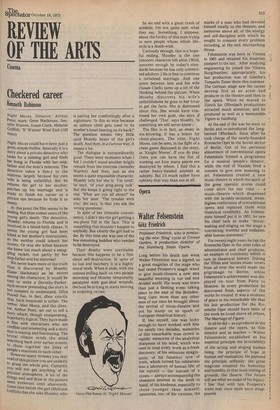Opera
Walter Felsenstein
Ciitz hiedrich
Professor Friedrich, who is producing the new 'Ring' cycle at Covent Garden, is production director of the Hamburg State Opera.
Long before his death last week Walter Felsentein was a legend, as a great magician of the stage who had raised Prospero's magic wand to give music-theatre a new and beautiful meaning in our sad and divided world. His work was more than just a fleeting event taking place to the east of the Brandenburg Gate: more than any other man of our time he brought about the revival of music-theatre and put his stamp on an epoch of European theatrical history.
If, like myself, one was lucky enough to have worked with him for nearly two decades, memories of this remarkable man crowd in rapidly: memories of the analytical sharpness of his mind, which was used to treat every work as a fresh discovery; of his sensuous imagination; of his fanatical love of truth, which turned his rehearsals into a laboratory of human life; of his naiveté. — the naivete of a clown — always accompanying the obsessive interest in the work in hand; of his kindness, especially to those younger than himself; memories, too, of his vanities, the
marks of a man who had devoted himself totally to the theatre; and memories above all, of the energy and self-discipline with which he sought to conquer every problem including, at the end, encroaching illness.
Felsenstein was born in Vienna in 1901 and retained his Austrian passport to the last. 'After studying engineering he joined the Vienna Burgtheather; appropriately, his. last production was of Goethe's Torquato Tasso there this summer. The German stage saw his career develop first as an actor and producer in the theatre and then in the opera. When he moved to Zilrich his Offenbach productions attracted much attention, and he produced as well as a memorable Figaro at Salzburg.
At the end of the war he went to Berlin and re-introduced the longbanned Offenbach. Soon after he took charge of the newly-founded Komische Oper in the Soviet sector of Berlin. Out of his personal abhorrence of conventional opera Felsenstein formed a programme for a musical 'people's theatre', while the end of Nazism bred a concern to give new meaning to art. Felsenstein created a new music-theatre in which the spirit of the great operatic scores could come alive for our time — a music-theatre which dispensed with the lavishly-mounted, meaningless confections of conventional opera and replaced them with theatrical credibility. As Felstenstein himself put it in 1951, he saw his chief task as make "musicmaking and singing on the stage a convincing, truthful and indispensible human statement."
For twenty-eight years he ran the Komische Oper in the joint roles of administrator and chief producer, an example of continuity which is rare in theatrical history. During the 'fifties and 'sixties music lovers from all over the world made the pilgrimage to Berlin, while Felsenstein's achievement was displayed on tour from Paris to Moscow. In every production he discovered fresh aspects of the works he treated. It was a moment of grace in his remarkable life that his last production for the Komische Oper should have been of the work he loved above all others, The Marriage of Figaro.
In all he did — as a producer in the theatre and the opera, as film director and as teacher — Walter Felstenstein established as his' essential principle the inviolability of the acting and singing human being: the principle of hope in human self-realisation. He pursued the principle selflessly: the great magician retained his humanity and humility in that most testing of grounds, the theatre. The future will see what we make of his legacy. I fear that with him Prospero's wand may once more have disappeared.


































 Previous page
Previous page